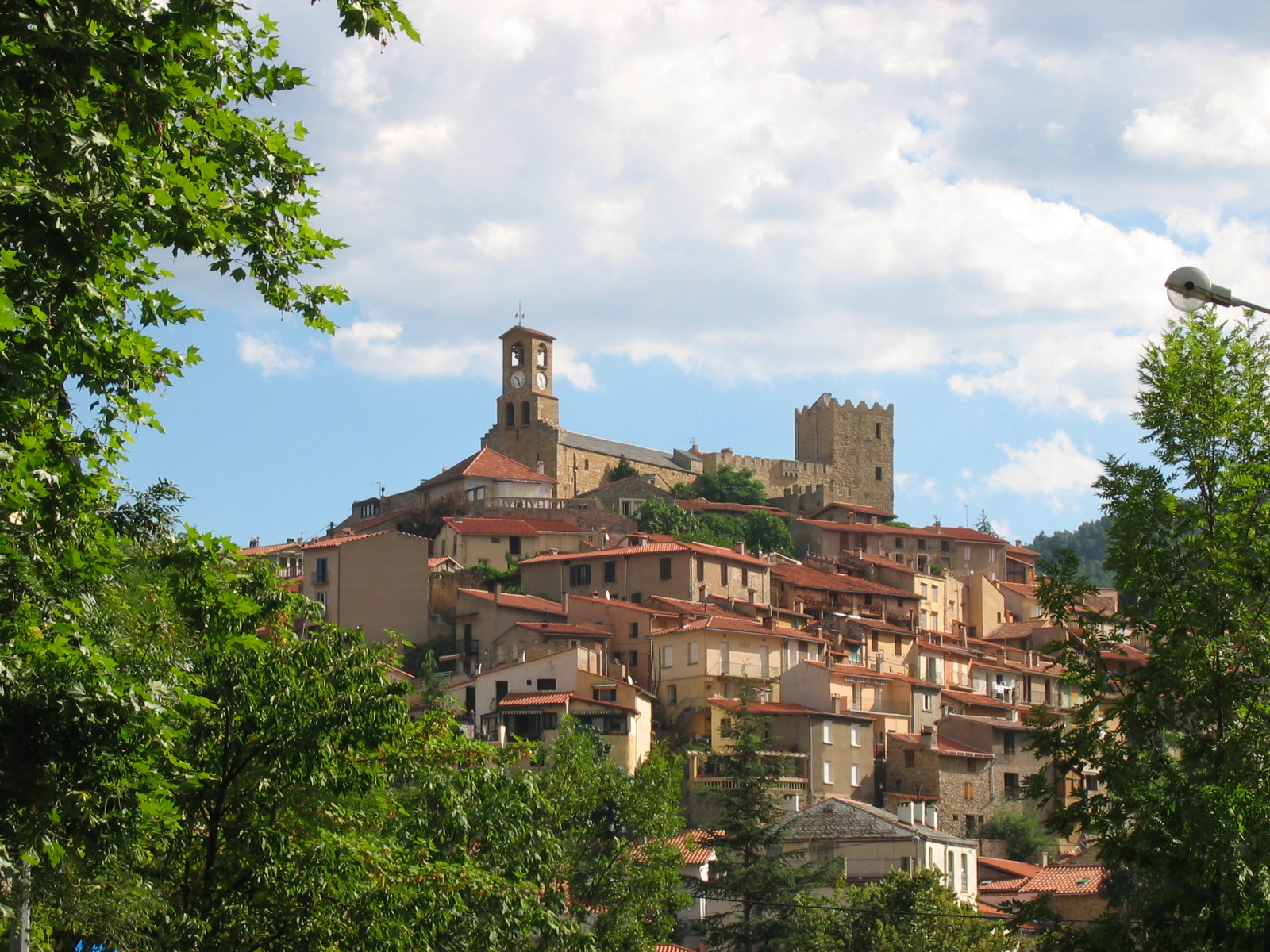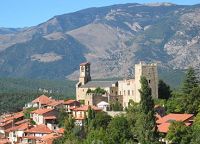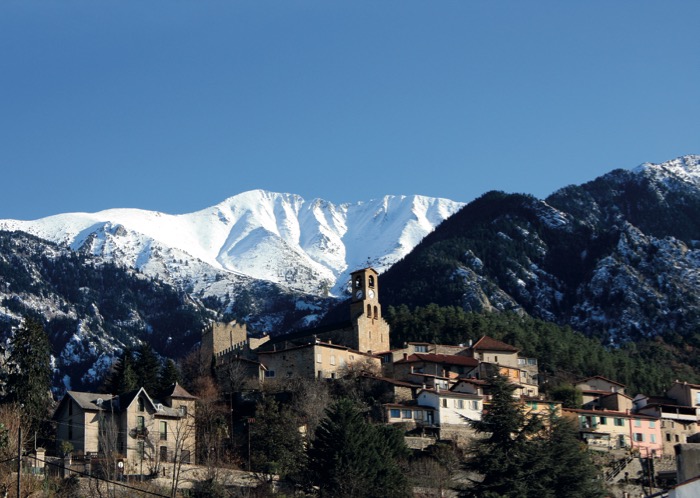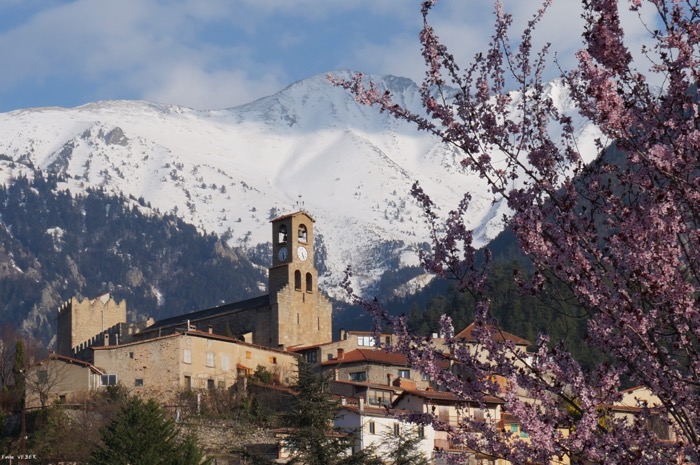A LEGEND OF ST. SATURNIA
by RUDYARD KIPLING
Did you know that Rudyard Kipling wrote a short story during one of his stays in Vernet-les-Bains in 1911?
‘Why does it snow in Vernet‘ pokes fun at the English habit of talking about the weather.

I had this legend from the rock which rises behind the laurestine bush and the loquat tree, in the winter garden.
Shortly after the end of the First Crusade, so the Rock told me, there came to Vernet, wearied by war and seeking a quiet life, two English knights – Sir Brian and Sir Gilbert, the one round and reddish, the other long and dark; the one limping from an inveterate sciatica, the other bowed in his saddle by as ancient a lumbago.
They arrived separately : Sir Brian on a Monday, Sir Gilbert on a Thursday. Sir Brian, after the simple usage of those days, possessed himself of the ground where the Vernet hotels now stand; Sir Gilbert, the later arrival, contenting himself with the pleasant fields round Casteil. Here, in a silence as profound as that of the mountains above, each devoted himself to the planting of vines and fruit trees, and the cure of his ailment.
On Tuesday, for example, Sir Brian betook himself and his leg to the sulphur-scented pools behind his modest hut, bathed for one hour, drank half a helmetful of heady Vaporarium and returned to his vineyards.
On Friday, Sir Gilbert, descending from Casteil, sat for two hours in the rock-cut basin which is now the Piscina, drank a full helmet of strong Barara, and fished the left bank of the river on his homeward way.

On Sundays the two would meet exactly below the great rock and exchange exactly seven words – one for each day of the week. Sir Brian would say to Sir Gilbert: “Ha! How’s back?” Sir Gilbert would reply: “Better thanks; how’s leg?”
So punctual were the performers in this ritual that the simple inhabitants of Vernet who, till then, had not much concerned themselves with the flight of time, used to set their church clock to twelve noon on the instant that the seventh of these words had been spoken.
Now there lived beside the church a holy man, destined afterwards to become a bishop and the patron-saint of the town, none other, indeed, than St. Saturnia himself.
His virtues as a silent and sympathetic listener, together with the excellencies of his cooking, so profoundly impressed the two knights that very soon Sir Brian made it his habit to dine with Saturnia every Saturday, while Sir Gilbert dined with him every Wednesday.
Nor were there lacking to these meals the wines of the rich countries round about – wines which awakened in the knights’ memories anecdotes of the most variegated and interesting.
At one of these little dinners given at the time young asparagus comes to perfection, Saturnia grew bold to speak intimately to Sir Brian.
“My son,” he said at dessert, “do you, by chance, live in mortal hatred of any of your neighbours?”
Sir Brian reached for the flask of Burgundy. “As for that,” he replied, “I am at peace with all men. To be otherwise would be bad for the sciatic nerve.”
“You are at peace then,” Saturnia hazarded, “even with Sir Gilbert?”
“But certainly,” said the Knight. “I have known and respected him for three and twenty years. It is true he is a bit of a bore if you let him talk about the siege of Antioch, but otherwise he is, as we say in England, not half a bad sort.”
“Pardon,” said Saturnia, “It is not then a challenge to mortal combat which you address to each other every Sunday, exactly at noon beneath the great Rock?”
Sir Brian removed the flask of Burgundy to his own side of the table. “My father,” he murmured respectfully, “may I recommend you to try white wines instead of red? You will find them less fatiguing. I remember, for example, at the Siege of Acre…” and he delighted his host with another of his incomparable and illuminating anecdotes.
“Decidedly,” said Saturnia to himself, “it must be Sir Gilbert who is at fault,” and on the Wednesday following he opened his heart to the long, dark knight, who listened to him with all the astonishment in the world.

“But, my father,” he cried at last, “not only did Sir Brian save my life eighteen years ago at the Siege of Antioch, but what is infinitely more important, he recommended to me these very baths which, as you can see, have cured my lumbago.”
“In that case,” said Saturnia, transported beyond politeness by his curiosity, “what is the meaning of the seven words which you address to each other every Sunday at noon beneath the great Rock?”
“We inquire,” Sir Gilbert responded, “after each other’s health. It is an English custom.”
“And you have no more?” demanded the holy man, greatly moved.
“Customs? We have thousands; all excellent,” said Sir Gilbert, who was also patriotic.
“I did not mean customs. I meant words – mere words,” Saturnia explained.
“Catapults of Antioch!” cried Sir Gilbert, “What is there for a man, much less men, to talk about in this country?”
“But, my son, you have regaled me continuously and without repetitions, through an entire year, by your stories of adventure among different races and countries. Except perhaps Sir Brian, who has also had experiences, I know no one so interesting as yourself.” And Saturnia bowed above his glass.
“Oh! Adventures and that sort of thing go without saying,” Sir Gilbert insisted, “and between you and me and this glass of Chablis – which is not as good, by the way, as last week’s Burgundy – Sir Brian is a bit of a bore if he gets talking about the Siege of Acre.”
“Then in England you do not talk at all?” Saturnia suggested. “On the contrary,” said Sir Gilbert, “but you see in England we have always the weather.”
“The weather? The weather?” Saturnia replied. “What is it then, that which you call weather?”
“The weather,” Sir Gilbert explained, “the weather, my father, is, in short, the weather. Here you have sunshine, and sunshine, and more sunshine, and then the rains on the 25th august or the 1st of September, and after that sunshine again. But, speaking of the weather, I remember when I was a young squire in England in May,” and Sir Gilbert delighted Saturnia with another of his well-chosen and edifying anecdotes.
“I understand,” said Saturnia at the end of his story, “it gives you English pleasure to be violently snowed upon when you expect sunshine?”
“Pleasure, no,” Sir Gilbert replied. “Conversation, yes. If you will allow me, my father, I would say that you lack in this country the essentials of true conversation.”

“Doubtless I grow old,” said the good man to himself as Sir Gilbert after dinner descended the steep streets of Vernet. “I have changed from Burgundy, which I appreciate, to Chablis, which I detest; but still I do not understand the English.”
Now this talk, so I was told by the Rock behind the Loquat, took place about midnight of March 10th. The next morning when Saturnia awoke he beheld with horror and consternation – for in those days the seasons were as regular and as excellent as the vintages – the entire valley covered with two or three inches of soft, fleecy snow, and the entire population of the town of Vernet hurrying to his door, shouting, gesticulating, amazed.
But not on account of the snow. “This is Thursday,” they cried. “Not Sunday, but Thursday! And it is not even ten o’clock on Thursday! Yet look at the knights! Look at the two English knights! How are we to set our clocks for the future if they transgress in this fashion?”
Saturnia looked and saw, at the unprecedented hour of 9.30 a.m., Sir Brian and Sir Gilbert walking side by side through the snow in loud but friendly conversation. They beat upon the snow with their sticks; they gazed at the sky, at the mountains, at each other; and re-plunged in to their discussion.
“What,” cried all the terror-stricken inhabitants of Vernet, “what does this unheard-of event portend? Is it an earthquake or a miracle?”
“My children,” said Saturnia, with the benignity of complete apprehension, “it is neither. It is the weather of which the English speak. Be silent, and you will hear them speaking.”
Indeed at that very moment, both knights ascended the hill, and panting, but still eloquent, hailed the venerable man.
“Did you ever,” they cried in chorus, “did you ever see such abominable weather? We were just speaking about it.”
And their faces shone with amity and an indescribable happiness.
From that year to the present, allowing for the necessary revision of the calendar, some snow, as everyone knows, falls here, for a day or two between the 11th and 22nd of March.
There are those who ascribe this to purely meteorological causes, but I prefer to believe, with the Rock behind the Loquat, that we owe it to the kindness and forethought of good St. Saturnia, who in his time moved well, and at last learned to understand, the first English visitors to Vernet.

